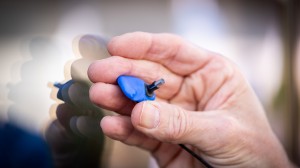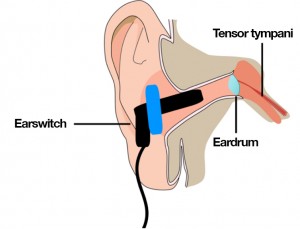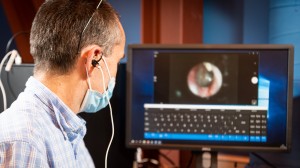A Bristol start-up developing wearable in-ear devices to help people with disabilities communicate has showcased its latest product at the world’s biggest technology show.
EarSwitch, which was set up to help people with disabilities including motor neurone disease (MND, also known as ALS) to communicate, demonstrated its new EarControl assistive technology at CES in Las Vegas last week.

The small, earbud-like device uses an in-built sensor to detect movements of a tiny muscle known as the tensor tympani.
This allows people who cannot use traditional input devices, such as a mouse or keyboard, to interact with a computer by acting as a 3D ‘ear mouse’.
They can then select letters and words displayed on a screen by tensing their ear muscles.
The tensor tympani is the muscle that moves when we yawn – and initial research from the EarSwitch team, based in the Future Space innovation hub on UWE Bristol’s Frenchay Campus, found that many people are able to use it voluntarily, with the possibility that it can be trained.

Doctors believe that with degenerative conditions such as MND, control of the tensor tympani muscle is preserved for longer than other muscles, and so EarSwitch hopes the technology can support users for longer.
Harnessing the muscle to help people with neurological conditions in this way could also allow them use mobile phones or play computer games.
EarSwitch is the brainchild of former Somerset-based GP Dr Nick Gompertz. Having set up the business at Future Space, it has also partnered with experts from the University of Bath in disciplines ranging from computer science and electronic engineering to health.
In 2022 the firm was awarded more than £1.5m from the National Institute for Health and Care Research (NIHR) to create a product from its technology and gain the appropriate regulatory approval to use it as a medical device while also exploring how it could be used to control an upper-limb exoskeleton or prosthesis.

Dr Gompertz said: “The collaboration with University of Bath continues to be pivotal in the advancement of EarSwitch to improve communication for people with conditions such as MND.”
The importance of this has been recognised by the Scott-Morgan Foundation (SMF), the world-leading charitable research body established by Dr Peter Scott-Morgan after he was diagnosed with MND in 2017 and is dedicated to rewriting the future of disability.
SMF has been demonstrating EarControl as part of a collaborative of assistive technologies at CES this week.
The team at the University of Bath supporting EarSwitch includes Dr Ben Metcalfe, Dr Dario Cazzola and Dr Chris Clarke.
Dr Metcalfe, who is deputy director of the Bath Institute for the Augmented Human, said: “We are delighted that EarSwitch continues to go from strength to strength and its showing at CES 2024 demonstrates its remarkable achievements over the past few years.
“The technology has the potential to transform the quality of life of those living with conditions such as motor neurone disease, and it is so pleasing to see that this work continues in the spirit of Peter Scott-Morgan and the Scott-Morgan Foundation.
Developing a new medical device is a complex process and we continue to support EarSwitch with both core technology development and ongoing clinical trials required for full regulatory approval. It is a real pleasure to see such continued success from Nick and the team.”
Last year, EarSwitch won Most Innovative Use of Tech at The SPARKies, the awards that champion the best of the West of England’s tech and digital community.






























